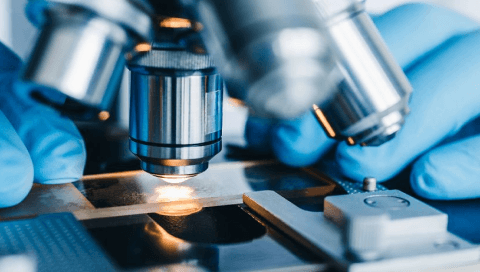Responsibility & Culture
An Unequivocal Victory for Innovation
May 23, 2023
A recent Supreme Court decision helps patients by protecting the scientific innovation emerging from America’s thriving biopharma community
By: Len Schleifer, MD, PhD, President and Chief Executive Officer

“[S]triking the proper balance between incentivizing inventors and ensuring the public receives the full benefit of their innovations is a policy judgment that belongs to Congress. … Section 112 of the Patent Act reflects Congress’s judgment that if an inventor claims a lot, but enables only a little, the public does not receive its benefit of the bargain. For more than 150 years, this Court has enforced the statutory enablement requirement according to its terms. … Today’s case may involve a new technology, but the legal principle is the same. The judgment is Affirmed.”
– Unanimous decision of the United States Supreme Court, Amgen v. Sanofi et al, May 18, 2023
Last week, the U.S. Supreme Court unanimously rejected a brash attempt to radically change the longstanding legal standard for patent validity and upend more than a century of established patent law. If successful, such a move would have slammed the door on research into entire classes of molecules, deterred competition, increased drug prices and prevented patients from accessing critical healthcare treatments. Instead, the Court brought a decade of litigation to a thundering close by rejecting Amgen’s asserted U.S. PCSK9 patent claims and backing Regeneron and Sanofi’s longstanding arguments for innovation, discovery and the boundless opportunities of science.
For the decade that this case – which was initiated by Amgen – wound its way through the court system, Regeneron and Sanofi have been steadfast in our defense of scientific innovation. We are grateful to the many biopharmaceutical and technology companies, legal and scientific experts, research and advocacy organizations, as well as the U.S. government, for joining us in opposing Amgen’s attempt to overturn the protections that exist for such innovation.
This broad chorus of voices from the public and private sectors recognized that in our industry, innovation matters. It leads to new medicines and therapies for people in need. The Supreme Court’s decision in this case will allow the pioneering scientists who make up America’s robust biopharma community to continue to flourish.
A quick rewind of what this case was about and why this ruling is a victory for innovation
Amgen v. Sanofi et. al was a long-running patent dispute between innovators – including our team at Regeneron – who independently developed antibody drugs that reduce low-density lipoprotein (“LDL”) cholesterol, the so called “bad” cholesterol that can increase the risk of heart disease. The antibodies bind to a protein, PCSK9, thus preventing the destruction of receptors that extract cholesterol from the bloodstream. Regeneron and Sanofi together developed Praluent, the first FDA-approved PCSK9 antibody. Amgen separately developed Repatha, the second such approved antibody. These antibodies differ in amino-acid sequence and where they bind to PCSK9, but both are used to treat patients with serious, but rare, forms of heart disease.
To try to corner the market for PCSK9 inhibitors, Amgen obtained additional patents that broadly claimed all antibodies that bind to certain amino acids on PCSK9 and block its binding to receptors. This was done well after Regeneron and Sanofi developed Praluent. Amgen then asserted that Praluent infringed Amgen’s new patents’ broad, functionally defined genus claims. Amgen brought a suit against Sanofi and Regeneron seeking damages, as well as an injunction to remove Praluent from the market – a move that, if sustained, would have been devastating for patients who rely on the medicine.
In a unanimous decision, the U.S. Court of Appeals for the Federal Circuit applied well-established law to the undisputed facts and determined that Amgen’s broad functional claims were not valid. Amgen then appealed to the U.S. Supreme Court.
At the crux of this case was the very foundation of patent law, enshrined in the U.S. Constitution. Often called the “patent bargain,” inventors agree to disclose an invention to the public in exchange for the exclusive right to that invention for a limited term. This protects and incentivizes inventors while also sustaining further research and development into the pursuit of new and better inventions. In our field, this has led to enormous progress and the discovery of new therapies that have saved and benefitted countless lives.
Central to this “patent bargain” is that a patent application must describe the invention sufficiently to enable those “skilled in the art” to make and use the invention without having to go through extensive trial and error or experimentation. Put simply, to develop new software, inventors shouldn’t first have to invent the computer. Amgen’s functional claims required excessive experimentation to make and use the invention, and would have covered an untold number of possible antibodies, even though they only provided limited examples of ones they’d discovered so far. In short, the claims were too broad and sought to go well beyond what was truly invented and disclosed; Amgen failed to uphold its end of the bargain.
As Nobel Laureate Sir Gregory Winter warned in a Wall Street Journal piece on the case, “If patents go too far—by allowing inventors to monopolize entire fields of future scientific endeavor—they can create barriers to innovation by preventing the very research that the patent system should be encouraging.”
For Regeneron, doing the right thing means protecting innovation and bringing new medicines to patients. We work every day to translate science into treatments that change lives, and we’re proud and grateful that the nation’s highest court held in our favor. The Supreme Court’s decision will protect both patients who want choice in this class of heart disease treatment and America’s thriving biopharma community by preserving the incentives that drive meaningful scientific discovery.